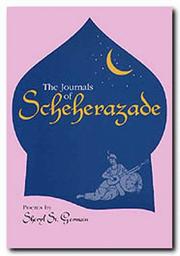| Listing 1 - 3 of 3 |
Sort by
|

ISBN: 058528170X 9780585281704 1574410105 9781574410105 Year: 1996 Publisher: Denton University of North Texas Press
Abstract | Keywords | Export | Availability | Bookmark
 Loading...
Loading...Choose an application
- Reference Manager
- EndNote
- RefWorks (Direct export to RefWorks)
American Literature --- English --- Languages & Literatures --- Scheherazade, --- شهرزاد، --- Shahrazād, --- Shahrzād, --- Šahrzād, --- Scheherazade --- Шехерезада, --- Shekherezada, --- Шахразада, --- Shakhrazada, --- Šeherzada, --- Chahrazad, --- Ŝehrazad, --- Xerezade, --- Shéhérazade, --- Sherezade, --- Šeherezada, --- Shehrazad, --- Шагьру-зада, --- Shagʹru-zada, --- Seherezádé, --- Scheherazad, --- Shahrazada, --- シェヘラザード, --- Sheherazādo, --- Sjeherasad, --- Szeherezada, --- Xerazade, --- Шахерезада, --- Shakherezada, --- Шихиразада, --- Shikhirazada, --- Sharazad,
Book
ISBN: 081474530X 9780814745304 9780814771716 0814771718 9780814745199 0814745199 9780814745199 Year: 2016 Publisher: New York, NY
Abstract | Keywords | Export | Availability | Bookmark
 Loading...
Loading...Choose an application
- Reference Manager
- EndNote
- RefWorks (Direct export to RefWorks)
Known to us only through North African manuscripts, and translated into English for the first time, A Hundred and One Nights is a marvelous example of the rich tradition of popular Arabic storytelling. Like its more famous sibling, the Thousand and One Nights, this collection opens with the frame story of Shahrazad, the gifted vizier’s daughter who recounts imaginative tales night after night in an effort to distract the murderous king from taking her life. A Hundred and One Nights features an almost entirely different set of stories, however, each one more thrilling, amusing, and disturbing than the last. In them, we encounter tales of epic warriors, buried treasures, disappearing brides, cannibal demon women, fatal shipwrecks, and clever ruses, where human strength and ingenuity play out against a backdrop of inexorable, inscrutable fate.Although these tales draw on motifs and story elements that circulated across cultures, A Hundred and One Nights is distinctly rooted in Arabic literary culture and the Islamic tradition. It is also likely much older than Thousand and One Nights, drawing on Indian and Chinese antecedents. This careful edition and vibrant translation of A Hundred and One Nights promises to transport readers, new and veteran alike, into its fantastical realms of magic and wonder.
Fairy tales. --- Folklore --- Fairy tales --- Fairytales --- Children's stories --- Tales --- Scheherazade, --- شهرزاد، --- Shahrazād, --- Shahrzād, --- Šahrzād, --- Scheherazade --- Шехерезада, --- Shekherezada, --- Шахразада, --- Shakhrazada, --- Šeherzada, --- Chahrazad, --- Ŝehrazad, --- Xerezade, --- Shéhérazade, --- Sherezade, --- Šeherezada, --- Shehrazad, --- Шагьру-зада, --- Shagʹru-zada, --- Seherezádé, --- Scheherazad, --- Shahrazada, --- シェヘラザード, --- Sheherazādo, --- Sjeherasad, --- Szeherezada, --- Xerazade, --- Шахерезада, --- Shakherezada, --- Шихиразада, --- Shikhirazada, --- Sharazad,
Book
ISBN: 1283896370 081220526X 0812242416 Year: 2010 Publisher: Philadelphia : University of Pennsylvania Press,
Abstract | Keywords | Export | Availability | Bookmark
 Loading...
Loading...Choose an application
- Reference Manager
- EndNote
- RefWorks (Direct export to RefWorks)
Over the past decade, scholars have vigorously reconsidered the history of Orientalism, and though Edward Said's hugely influential work remains a touchstone of the discussion, Karla Mallette notes, it can no longer be taken as the final word on Western perceptions of the Islamic East. The French and British Orientalisms that Said studied in particular were shaped by the French and British colonial projects in Muslim regions; nations that did not have such investments in the Middle East generated significantly different perceptions of Islamic and Arabic culture. European Modernity and the Arab Mediterranean examines Orientalist philological scholarship of southern Europe produced between the mid-nineteenth and mid-twentieth century. In Italy, Spain, and Malta, Mallette argues, a regional history of Arab occupation during the Middle Ages gave scholars a focus different from that of their northern European colleagues; in studying the Arab world, they were not so much looking on a distant and radically different history as seeking to reconstruct the past of their own nations. She demonstrates that in specific instances, Orientalists wrote their nations' Arab history as the origin of modern national identity, depicting Islamic thought not as exterior to European modernity but rather as formative of and central to it. Joining comparative insights to the analytic strategies and historical genius of philology, Mallette ranges from the complex manuscript history of the Thousand and One Nights to the invention of the Maltese language and Spanish scholarship on Dante and Islam. Throughout, she reveals the profound influences Arab and Islamic traditions have had on the development of modern European culture. European Modernity and the Arab Mediterranean is an engaging study that sheds new light on the history of Orientalism, the future of philology, and the postcolonial Middle Ages.
Islamic civilization. --- Arabic philology --- Civilization, Islamic --- Muslim civilization --- Civilization --- Civilization, Arab --- History --- Scheherazade --- شهرزاد، --- Shahrazād, --- Shahrzād, --- Šahrzād, --- Шехерезада, --- Shekherezada, --- Шахразада, --- Shakhrazada, --- Šeherzada, --- Chahrazad, --- Ŝehrazad, --- Xerezade, --- Shéhérazade, --- Sherezade, --- Šeherezada, --- Shehrazad, --- Шагьру-зада, --- Shagʹru-zada, --- Seherezádé, --- Scheherazad, --- Shahrazada, --- シェヘラザード, --- Sheherazādo, --- Sjeherasad, --- Szeherezada, --- Xerazade, --- Шахерезада, --- Shakherezada, --- Шихиразада, --- Shikhirazada, --- Sharazad, --- Europe --- Arab influences. --- Scheherazade (Legendary character) --- Scheherazade, --- Cultural Studies. --- European History. --- History. --- Literature. --- Medieval and Renaissance Studies. --- World History.
| Listing 1 - 3 of 3 |
Sort by
|

 Search
Search Feedback
Feedback About UniCat
About UniCat  Help
Help News
News